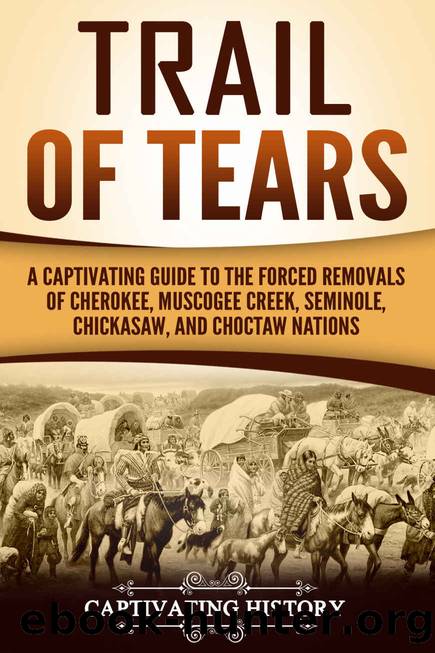Trail of Tears: A Captivating Guide to the Forced Removals of Cherokee, Muscogee Creek, Seminole, Chickasaw, and Choctaw Nations by History Captivating

Author:History, Captivating
Language: eng
Format: epub
Published: 2018-04-09T16:00:00+00:00
A Legacy of Racism and Manifest Destiny
Jacksonâs hatred toward natives was certainly rooted in racism and a strongly held belief in Manifest Destiny. Whether or not he believed he was a man of the people, Jackson believed that white people were the rightful owners of all the land that had been acquired, and he did not like anyone telling him otherwise. When the Supreme Court ruled against him and for the Cherokee Nation, he said that the decision was stillborn, and he ignored it believing himself to be above the courtâs law. He was the accumulation of centuries of the worst in thinking against non-whites, and he made decisions based on those beliefs.
His blatant racism and continued push based on the idea that whites were the rightful owners of the land were beyond unacceptable to some notable figures of the time. Perhaps the most striking and famous American figures against Andrew Jackson and his treatment of the Cherokees was Davy Crockett. In his own words, Crockett decried the treatment of the Cherokees, ââ¦at this time our Republican Government has dwindled almost into insignificancy, our [boasted] land of liberty have almost Bowed to the yoke of [sic] Bondage.â He threatened to leave the country for the âwilds of Texasâ if the vice president, Martin Van Buren, were to win the next election. He was actually a member of Congress when he expressed these views, and he did not wait for Van Buren to win before he left the US for Texas, where he famously died at the Alamo.
While many were pleased with the removal of natives who would fight against white expansion, the treatment of the Cherokee Nation was seen as a serious offense because the people were so similar to the Americans. There was a relatively large part of the population who had interacted with the natives, and the Cherokee people did not fit into the presented narrative about other native peoples. The fact that the Cherokee people were willing to work their way patiently through the American court system, even starting again when a new approach made it possible for them to present their case swayed many Americans to see the Cherokees as more similar than dissimilar. It was only the small fraction of those who were loyal either to Jackson or to their own ambition that pushed the Cherokees from their lands. While it could be argued that eventually they would have been forced from their lands, as Jackson constantly argued, given the favorable impression of them and the portrayal of them, it is possible that they may have found another way through the crisis if not for Jackson's blatant racism and hatred for all natives. Manifest Destiny and racism were the blinders that forced thousands of peaceful Cherokees from their lands, condemning thousands of them to death at the hands of an immoral leader who cared only about his own opinions and decrees.
Download
This site does not store any files on its server. We only index and link to content provided by other sites. Please contact the content providers to delete copyright contents if any and email us, we'll remove relevant links or contents immediately.
The Art of Coaching Workbook by Elena Aguilar(48067)
Trainspotting by Irvine Welsh(20057)
Twilight of the Idols With the Antichrist and Ecce Homo by Friedrich Nietzsche(17707)
Fangirl by Rainbow Rowell(7835)
Periodization Training for Sports by Tudor Bompa(7329)
Change Your Questions, Change Your Life by Marilee Adams(6641)
This Is How You Lose Her by Junot Diaz(5774)
Grit by Angela Duckworth(4738)
Red Sparrow by Jason Matthews(4668)
Asking the Right Questions: A Guide to Critical Thinking by M. Neil Browne & Stuart M. Keeley(4576)
Paper Towns by Green John(4169)
Room 212 by Kate Stewart(4107)
Ken Follett - World without end by Ken Follett(3973)
The Sports Rules Book by Human Kinetics(3588)
Housekeeping by Marilynne Robinson(3402)
The Motorcycle Diaries by Ernesto Che Guevara(3333)
Introduction to Kinesiology by Shirl J. Hoffman(3301)
Exercise Technique Manual for Resistance Training by National Strength & Conditioning Association(3292)
Double Down (Diary of a Wimpy Kid Book 11) by Jeff Kinney(3274)
